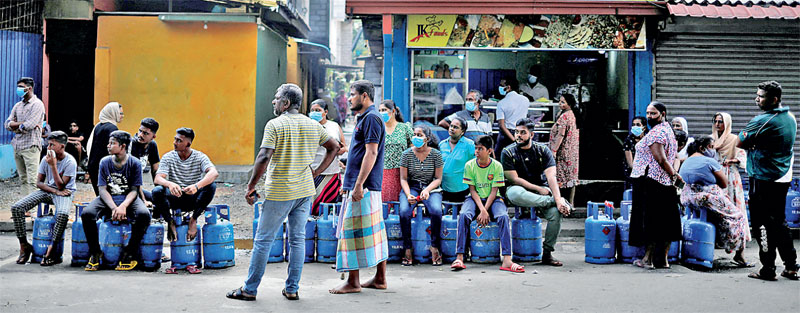Saturday Feb 21, 2026
Saturday Feb 21, 2026
Monday, 23 May 2022 03:42 - - {{hitsCtrl.values.hits}}

People sit on their empty cylinders as they wait in a queue to buy domestic gas at a distribution centre in Colombo. Monthly requirement for LPG imports is only $ 30 million which can be easily sourced by using monthly export earnings worth $ 1 billion – Pic by Reuters
The Government is considering bringing regulations to ensure exporters convert their foreign exchange earnings immediately in a bid to ease the pressure on the reserves and urgently meet essential imports such as LPG, medicines and fuel.
The move follows the revelation that exporters continue to hold their forex earnings without converting, on the anticipation of the vying for exchange gains despite recent efforts by the Central Bank to minimise sharp volatility.
As per CBSL data, merchandised exports in the first quarter grew by 9% to $ 3.2 billion whilst according to private sector preliminary estimates performance in the first four months is around $ 4 billion and if Services exports are included the figure is around $ 5 billion. However, exporters have converted only around $ 2 billion, implying that $ 3 billion worth of forex earnings are unconverted. At present, CBSL’s requirement is that exporters need to repatriate export proceeds by the seventh day of the next month and sectors such as apparel can retain 60 to 70% to source their imported inputs.
However, export sectors such as tea, coconut, other agriculture, seafood, IT, gems which have zero or very low imported inputs are said to be among those delaying conversion.
The need to ensure quick conversion had even come up for discussion at a meeting convened by Prime Minister Ranil Wickremesinghe with the apparel exporters and tea exporters in recent days.
With the country struggling to secure foreign exchange for urgent imports such as LPG, essential medicine and fuel, and the people languishing in long queues, the delay of conversion by unscrupulous exporters is coming under close scrutiny.
“We need around $ 30 million a month for LPG imports and a further $ 30 million for urgent medicines. These could be met via billions of export earnings so far this year. Even part of the fuel import bill could be financed via exports,” sources told the Daily FT.
In that context they said exporters opting to delay conversion is selfish and turns a blind eye to mass sufferings of the people. The worst development is that some exporters use forex earnings to import non-related goods to related and non-related parties. When it comes to the latter exporters fetch a premium for such favours granted.
Official sources said that despite the country opting to a flexible exchange rate policy since early March, the behaviour of exporters is appalling and the Government is finalising new regulations to ensure legitimate conversion.
In the first quarter top exporters included apparel ($ 1.4 billion up 11%), tea ($ 287 million - 15%), rubber ($ 252 million - 2%), machinery and mechanical appliances ($ 134 million +7%), coconut ($ 105 million + 8.8%), gems, diamonds and jewellery (94 million +32%), spices ($ 85 million -25%), and seafood ($ 68 million +20%),
In September last year, the then Central Bank Governor Nivard Cabraal too exposed the fact that exporters were hoarding $ 2.7 billion in earnings overseas.
The CBSL said regional economies such as Bangladesh, India, Indonesia, Malaysia, Nepal, Pakistan and Thailand had export proceeds repatriation requirements currently in place varying from three months to two years of the export. Bangladesh, India, Pakistan and Thailand have repatriation requirements on both goods and services export proceeds, while in Nepal, Malaysia and Indonesia, the repatriation requirement is only applicable on goods exports.
